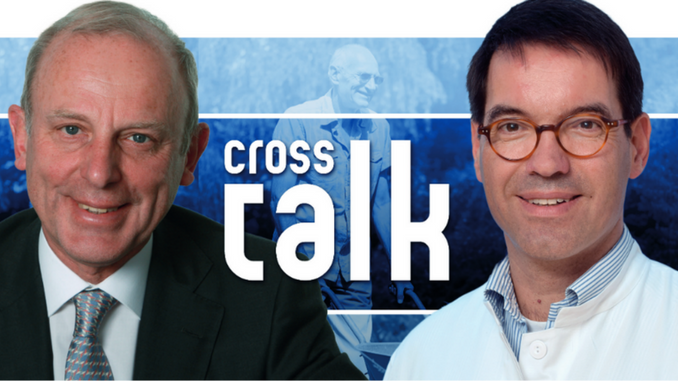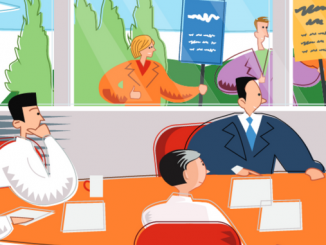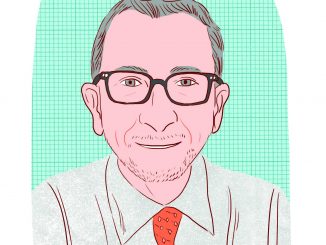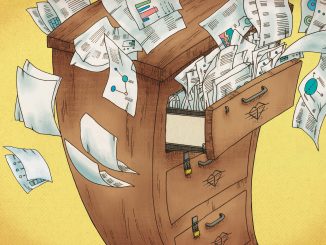
Karol Sikora, a medical oncologist who has directed cancer services at a major London hospital, triggered an angry reaction earlier this year when he suggested that younger patients should have priority when it comes to accessing very expensive, potentially life extending, cancer therapies. But did he have a point? we asked Ulrich Wedding, a specialist in cancer in the elderly and a board member of the International Society of Geriatric Oncology, to debate the issue with Sikora to see if they could find any common ground
Last May, Karol Sikora, former director of cancer services at Hammersmith Hospital in West London, who led the WHO’s cancer programme between 1997 and 1999, hit the headlines when he suggested that younger patients should have priority when it comes to accessing some of the very expensive new cancer drugs. We all have to die of something, he argued, and giving everyone the right to “stave off the evil hour of death” for as long as possible, no matter what the cost, is unsustainable.
His statement provoked some angry reactions.
Ciarán Devane, Chief Executive of Macmillan Cancer Support, spoke for many in the medical profession when he said: “We have a duty to treat people as individuals and assess them based on their fitness for treatment, not date of birth,” and that to deny older cancer patients treatment based on their age alone is unacceptable discrimination. This is a view strongly endorsed by SIOG, the international organisation of oncologists specialising in treating elderly patients.
But is it really so unacceptable? With rationing of expensive treatments becoming the norm among European countries, should people struck with ill health at an earlier age be denied the therapies they need because health budgets cannot meet the huge demand – not least for cancer care – among people nearing the end of their expected lifespan?
Cancer World’s Liz Bestic asked Ulrich Wedding, a specialist in geriatric oncology at Jena University Hospital in Germany and SIOG board member, to discuss the issues with Karol Sikora to see whether they could find common ground.
Karol Sikora
Every healthcare system in the world is struggling to contain the rising costs of cancer care. None can do everything for everybody so we have to have priorities. That may mean limiting access to some very expensive life-extending cancer drugs on the grounds of age as well as other factors.
Prioritisation can involve several factors: the quality of life of the patient, the likelihood that the drug will be successful, the relative stage of the cancer, and how many previous treatments have been given.
Oncologists have always taken these factors into account. The problem now is huge escalation in the costs of drugs for only months or weeks of survival benefit. Over the past decade we have seen the monthly cost of a box of cancer pills escalate from a few pounds to over £8,000.
So we have to be sensible.
Ulrich Wedding
 It is not justified to look at the cost of cancer care separate from other healthcare costs. Even healthcare costs should not be looked at separately from other public spending. The topic comes up because, as you say, the cancer drugs are very expensive.
It is not justified to look at the cost of cancer care separate from other healthcare costs. Even healthcare costs should not be looked at separately from other public spending. The topic comes up because, as you say, the cancer drugs are very expensive.
However, when looking at older cancer patients, chronological age is not always a good criterion for decision making. If you compare a group of let’s say 70- to 80-year-old patients, they are a very heterogeneous group. Some are very fit and independent in their daily lives. They travel around and even care for other people. Others have very poor health status with chronic diseases and need of social support.
To say the life of a 90-year-old woman is not as worthwhile as that of a 30-year-old breast cancer patient should not be part of the oncologist’s thinking. Otherwise oncologists are playing God. It should not be their decision that the additional year for the 90-year-old is not as worthwhile as for a 30-year-old.
I also believe that when a drug is approved it should be possible for all patients with a good risk–benefit ratio to receive that drug. It should not be a decision made at the bedside by oncologists. The oncologist has to decide on the risk not the value of the benefit.
Karol Sikora
 You simply can’t dilute out the problem by involving other sectors in healthcare. If we, as oncologists, have been tasked with finding a solution for cancer, then I believe that age should come into it. Of course biological age as well as quality of life and its productivity need to be factored in as well. Chronological age is well defined – the other criteria are less so, and so must involve value judgements, which are of course subjective.
You simply can’t dilute out the problem by involving other sectors in healthcare. If we, as oncologists, have been tasked with finding a solution for cancer, then I believe that age should come into it. Of course biological age as well as quality of life and its productivity need to be factored in as well. Chronological age is well defined – the other criteria are less so, and so must involve value judgements, which are of course subjective.
I agree with you that the expected level of clinical benefit has to be factored into the equation whether or not to give a high-cost cancer drug, whatever the patient’s age. But I do believe that we should give younger patients more options in the form of different lines of treatment compared with older cancer patients, and this is common practice in most countries. The real problem is that we have no idea how effective a drug will be until we give it.
Oncologists ration drugs all the time by age anyway. Interestingly if you go to most middle-income countries where healthcare is not completely free, patients too are much more savvy about the relative values of prolonging life at great cost.
Rationing is inevitable, and we have to decide how to do it in the fairest way. I still think age is one of the factors that needs to be considered, along with comorbidities as you suggest. On the whole these come with age of course. And nowadays individuals can circumvent government or insurer rationing simply by paying for the drug if they have the resources. That’s the way a free market works whether we like it or not.
Ulrich Wedding
 I don’t believe the free market can apply here because we’re talking about healthcare. The patient is not a customer who can simply buy the drugs he wants to have. In Germany you certainly cannot buy a drug from another country and use it over here. A medical system is different because the doctor has to decide if the drug is going to be of benefit to the patient.
I don’t believe the free market can apply here because we’re talking about healthcare. The patient is not a customer who can simply buy the drugs he wants to have. In Germany you certainly cannot buy a drug from another country and use it over here. A medical system is different because the doctor has to decide if the drug is going to be of benefit to the patient.
Only if there is a likelihood of medical benefit of receiving a certain drug is it important to know whether the patient wants the drug or not. The use of any drug should be supported by the likelihood of benefit not simply the availability of the drug.
Whether or not we make a decision to treat younger patients as opposed to older needs to be looked at case by case. The younger patient may be justified if the benefit is greater for them. So if you have a 30-year-old who is already on a fourth-line treatment compared to an 80-year-old on their first treatment the older patient may get more benefit.
Karol Sikora
 I’m afraid the free market is very much alive and kicking and the reality is that a drug is a market commodity. The price of a box of pills cannot be different because of different response rates in different people. A new car is the same price even though some break down after three or four years. You don’t get your money back. In free markets, commodities are purchased where they are cheapest and with internet pharmacies there are no borders any more.
I’m afraid the free market is very much alive and kicking and the reality is that a drug is a market commodity. The price of a box of pills cannot be different because of different response rates in different people. A new car is the same price even though some break down after three or four years. You don’t get your money back. In free markets, commodities are purchased where they are cheapest and with internet pharmacies there are no borders any more.
Comorbidities and functional status are all relative. I have a delightful 80-year-old lady with widespread bone metastases who walks five miles a day to get her shopping. She is failing on capecitabine, having already had FEC and docetaxel. So should I start her on a fourth line of chemotherapy? We know her gain from this is likely to be small. So if drugs have to be rationed, and they do, then surely people who are likely to live for a long time should get priority? So that means the young should be higher up in the pecking order than the old.
Ulrich Wedding
 Perhaps this should be a question for society as a whole? Should oncologists really have to take into account the price of the drug when they make their bed to bed decisions or should it be something which is decided by society? Who decides whether it is worthwhile to invest something like €50,000 for one year of additional life? In the UK NICE takes this into account when deciding on drug approval, but it is very different in each country in Europe.
Perhaps this should be a question for society as a whole? Should oncologists really have to take into account the price of the drug when they make their bed to bed decisions or should it be something which is decided by society? Who decides whether it is worthwhile to invest something like €50,000 for one year of additional life? In the UK NICE takes this into account when deciding on drug approval, but it is very different in each country in Europe.
In Germany there is a new system which has been introduced to decide whether a new drug implies a substantial improvement in the patient care, and that is when a higher price is justified. If there is only a small benefit or no additional benefit, the price the company can get for the drug is much smaller. I think there needs to be more pressure on the companies to have more affordable drugs.
But we need also to guard against ageism here. Older people are under-represented in most clinical trials and so we need more studies particularly those which focus on older patients where there is very little data. There is plenty of evidence out there that older patients are very keen to participate in randomised controlled trials if they are offered, which is why we try to encourage older patients to take part in our research.
These studies are vital so that patients can make more informed decisions. We need to be able to say openly and honestly there are no data that says you will benefit from this treatment so that no treatments are given simply based on the wishes of a patient.
Karol Sikora
 You are right– the patient has to have all the information to make an informed choice, and increasingly there is a general move away from the ‘doctor knows best’ approach into a much more collaborative approach with the patient.
You are right– the patient has to have all the information to make an informed choice, and increasingly there is a general move away from the ‘doctor knows best’ approach into a much more collaborative approach with the patient.
So I am not advocating an age cut-off for expensive cancer drugs. But age, and more importantly quality of life, are the criteria which need to be factored into the decision to treat actively or to provide best supportive care.
There is no magic age, but there are a whole series of things that come into consideration. We do it anyway, despite the fact that in our NHS there is a total anti-ageist policy. Many of the decisions that are made are not because the patient wouldn’t tolerate it, but because the benefit is so small even if it’s successful.
I believe that cancer drug rationing is now inevitable in all health economies. Even the richest systems in Europe and the US cannot support that, and it is a huge crisis.
It’s now time to be explicit. This seems only fair when the value of giving £100,000 of cancer drug is bound to have much greater potential benefit in someone whose life expectancy is 40 years rather than five.
Ulrich Wedding
 We have all got to die some time, but we are afraid of looking at death. Death is inevitable. So we need to be more honest and open with patients about their chances of survival. Oncologists are often afraid to speak about their own limits of the treatment, and perhaps need to be more open about saying that chemotherapy will not help. Patients also need to be aware and not have their expectations raised.
We have all got to die some time, but we are afraid of looking at death. Death is inevitable. So we need to be more honest and open with patients about their chances of survival. Oncologists are often afraid to speak about their own limits of the treatment, and perhaps need to be more open about saying that chemotherapy will not help. Patients also need to be aware and not have their expectations raised.
When I talk to my patients I often say it’s no problem to give you another infusion of chemotherapy. We can do that and often do. But the really difficult decision is whether you benefit from that treatment. The patient sometimes has to understand that the better decision is to do nothing. Even though they may have a limited lifespan they can enjoy it without having to go through more gruelling therapy.





